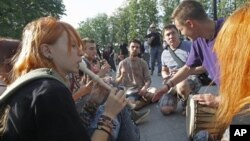MOSCOW - Police dispersed opposition activists camping out in a park in central Moscow Wednesday, acting on a court order issued a day earlier.
Police arrived at the park, located in the capital’s Chistiye Prudy district, around 5:30 a.m., hours ahead of the noon deadline cited in Tuesday’s court order. A district court issued the ruling after several local residents filed a suit demanding the activists be evicted.
The camp was set up after a May 6 protest against President Vladimir Putin’s inauguration for a third term. The demonstration ended in violence and mass arrests, and was followed by several nighttime marches in which hundreds more were arrested.
Following the lead of the global Occupy movement, protesters at Chistiye Prudy pitched tents near a bronze statue of the 19th-century Kazakh poet and philosopher Abai Kunanbayaev, dubbing the action "Occupy Abai." On Sunday, several thousand people led by a group of prominent Russian writers marched from Pushkin Square to the Occupy Abai campsite in a show of solidarity.
Following their Wednesday eviction, several dozen Occupy Abai activists relocated to a square near Moscow’s Barrikadnaya metro station, about three kilometers west.
One of the opposition leaders, Ilya Yashin, said closure of the Occupy Abai camp in no way marks the end of Russia’s fledgling Occupy movement.
The movement does not yet have "specific plans," he said, but it is working according to a strategy formulated even before the emergence of Occupy Abai. The square at Barrikadnaya metro would be used as a "collection point" for protesters, he said, adding that he had seen no “aggression” on the part of police there thus far.
Vladimir, an opposition activist from Russia’s northern Murmansk region who provided no last name, was among those forced out of the Occupy Abai camp. He also said the protest movement will continue.
"We [he and fellow protesters] believe Putin is an illegitimate president and are trying to make [our] views known to the rest of the world," he said.
Vladimir Pribylovsky of the Panorama think tank believes the closure of the Occupy Abai camp could backfire.
"Thanks to the camp, the opposition movement is drawing in new supporters, particularly among young people," he said.
Maxim Trudolyubov, editorial page editor of the newspaper Vedomosti, said the Occupy movement is just one manifestation of Russia’s emerging civil society.
"Society has proved to itself that people are able to organize - to produce mass events, rallies, walks, accomplish projects," he said. "So I think, on the positive side is the fact that many other things are up and running, and people individually are feeling better as being members of this newly active civic society."
The negative trend in the ongoing struggle between the authorities and the opposition, he said, is that authorities have "clearly shown" they are prepared to use force to get their way.
Meanwhile, Moscow authorities were quoted Wednesday as saying tents will no longer be allowed in city parks.
Police arrived at the park, located in the capital’s Chistiye Prudy district, around 5:30 a.m., hours ahead of the noon deadline cited in Tuesday’s court order. A district court issued the ruling after several local residents filed a suit demanding the activists be evicted.
The camp was set up after a May 6 protest against President Vladimir Putin’s inauguration for a third term. The demonstration ended in violence and mass arrests, and was followed by several nighttime marches in which hundreds more were arrested.
Following the lead of the global Occupy movement, protesters at Chistiye Prudy pitched tents near a bronze statue of the 19th-century Kazakh poet and philosopher Abai Kunanbayaev, dubbing the action "Occupy Abai." On Sunday, several thousand people led by a group of prominent Russian writers marched from Pushkin Square to the Occupy Abai campsite in a show of solidarity.
Following their Wednesday eviction, several dozen Occupy Abai activists relocated to a square near Moscow’s Barrikadnaya metro station, about three kilometers west.
One of the opposition leaders, Ilya Yashin, said closure of the Occupy Abai camp in no way marks the end of Russia’s fledgling Occupy movement.
The movement does not yet have "specific plans," he said, but it is working according to a strategy formulated even before the emergence of Occupy Abai. The square at Barrikadnaya metro would be used as a "collection point" for protesters, he said, adding that he had seen no “aggression” on the part of police there thus far.
Vladimir, an opposition activist from Russia’s northern Murmansk region who provided no last name, was among those forced out of the Occupy Abai camp. He also said the protest movement will continue.
"We [he and fellow protesters] believe Putin is an illegitimate president and are trying to make [our] views known to the rest of the world," he said.
Vladimir Pribylovsky of the Panorama think tank believes the closure of the Occupy Abai camp could backfire.
"Thanks to the camp, the opposition movement is drawing in new supporters, particularly among young people," he said.
Maxim Trudolyubov, editorial page editor of the newspaper Vedomosti, said the Occupy movement is just one manifestation of Russia’s emerging civil society.
"Society has proved to itself that people are able to organize - to produce mass events, rallies, walks, accomplish projects," he said. "So I think, on the positive side is the fact that many other things are up and running, and people individually are feeling better as being members of this newly active civic society."
The negative trend in the ongoing struggle between the authorities and the opposition, he said, is that authorities have "clearly shown" they are prepared to use force to get their way.
Meanwhile, Moscow authorities were quoted Wednesday as saying tents will no longer be allowed in city parks.




